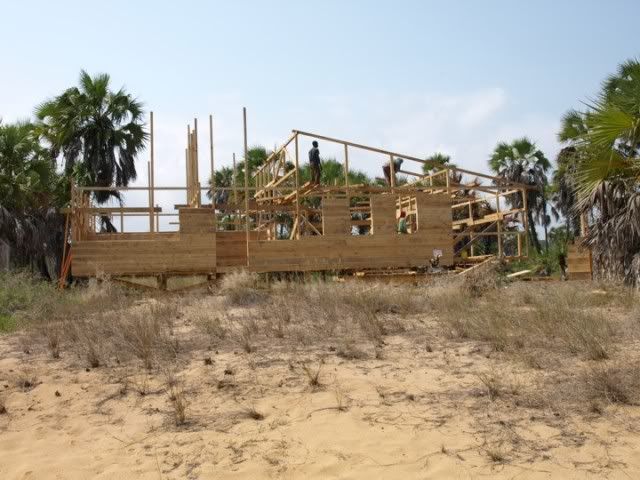A friend of mine is having a wooden house built in Angola. Unfortuntely, the contractor seems to have run out of money but has done a good job thus far; essentially he has built the shell (about 20m x 12m) and clad it on the outside in nice thick planks and has put on a galvanised sheet metal roof. He has also installed doors, windows and wooden floors (ie, it is watertight). The quality of work is high by Angolan standards and my friend is pleased with the work.
The contractor is now slowly doing first fix electrics, plumbing etc. But my friend has his wife and child living in a small one room shack and needs to get the house habitable as a matter of urgency. So he has conceded that the build is going to cost more to get it done quickly and he is just going to have to fork out and try and get some monies back off the contractor in due course, some way or another! Upfront payments are quite normal here and litigation is useless unless you are Angolan and (ideally) connected.
But the problem is that the contractor does not seem to have thought about how he was going to clad the inside of what is essentially just a large, single skin, garden shed (two bedrooms, a shower room and an open plan kitchen and living area)... I think he thought my friend would accept having exposed wires and tubes...
So the contractor has suggested plasterboard that is drylined for both walls and ceiling.
I have countered that as there is no cavity, plasterboard is unsuitable as when the shed gets wet, moisture may cross the cladding and structure of the building to which the plasterboard if fixed. Although it is normally blistering hot here each day, in the rainy season, when it rains it can sometimes really rain (tropical storm etc). Then as soon as it finishes, it is normally baking hot again.
I have suggested
1). using a plastic ceiling as it is cheap and water resistant and then cladding the walls in large squares of thin ply and covering the joins with thin timbers to give a rustic effect that should dry out in the heat after rain.
2). Alternatively I have suggested cement board and tiling for the walls as tiles here are very popular and easy to clean but this is an expensive option. I think he should certainly use cement board where tiles will be affixed (ie, kitchen and shower room). Cement board here is extremely expensive though, and tiles are not cheap so to the whole interior in this manner is expensive.
3). My other suggestion was to use several layers of chicken wire and render the insides of the wall and then finish the walls to a smooth finish. I guess this could be tiled too if the walls and their wire mesh reinforcement are strong enough.
4). If you are going to use plasterboard at least try and create some sort of cavity. In industrial applications metal 'furrings' are often put together into a structure to affix plasterboard ceilings to... If you used these furrings, you could affix these to the inside of the structure and fix your plasterboard to these and this might prevent moisture penetrating across to the plasterboard.
So the question here is would you go with plasterboard or would you use one of my options - if so which one? If you have other suggestions, I'd be pleased to hear them...
Ted
I will try and post up some photos of the build in due course but at the rate this build is going I have several weeks to do this.
This was it a month or two ago...

It is a fair distance from my house but I'll get some more up to date photos soon.
Essentially the question is, what system would you use if you wanted to clad the inside of a beach hut in a place like Thailand or Mexico - but as a place where you are going to live for a long while...?